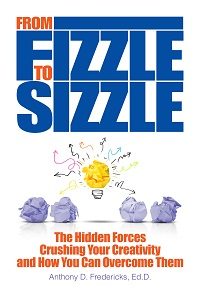Blog
Looking for Little Things
Creative Minds
A Regular Column by Anthony D. Fredericks
Looking for Little Things
 We often have this mistaken idea that a creative idea is a big idea. The invention of manned flight, the cure for polio, the creation of the World Wide Web, and the development of a vaccine for COVID-19. True, those are big creative concepts; but true creativity is founded on a principle of little discoveries…the small treasures we find when we envision creativity as “looking for the small, not just the big.” Discovering a synonym for “said” in the novel we’re writing. Mixing three colors together for the sunset in a landscape painting we’re working on. Discovering that a paper clip can be used to repair a broken toy. Lots of little creative acts gets us in the habit of making creativity a normal and natural part of our daily lives, rather than just an event that happens on rare occasions.
We often have this mistaken idea that a creative idea is a big idea. The invention of manned flight, the cure for polio, the creation of the World Wide Web, and the development of a vaccine for COVID-19. True, those are big creative concepts; but true creativity is founded on a principle of little discoveries…the small treasures we find when we envision creativity as “looking for the small, not just the big.” Discovering a synonym for “said” in the novel we’re writing. Mixing three colors together for the sunset in a landscape painting we’re working on. Discovering that a paper clip can be used to repair a broken toy. Lots of little creative acts gets us in the habit of making creativity a normal and natural part of our daily lives, rather than just an event that happens on rare occasions.
Stephen Guise makes a case for the power of small habits, rather than our over-reliance on large, wieldy, and often weighty big habits. He makes a valid point when he says, “Big intensions are worthless if they don’t bring results.” For example, we may make a resolution to lose 50 pounds this year, but we often find ourselves giving up (sooner, rather than later) because the perceived goal was much too large.
Guise makes two clear and penetrating points: “1) Doing a little bit is infinitely bigger and better than doing nothing, and 2) doing a little bit every day has a greater impact than doing a lot on one day.” Now, let’s put that in terms of our personal creativity: 1) Looking for one little piece of creativity is better than doing nothing at all, and 2) looking for a little (creative) thing every day is much more effective and practical than trying to generate a very large idea every so often.
The point is clear – a determination to make creativity a regular and normal part of our daily activities prepares our mind to be ready for those times when we need a really large (and/or profitable) idea in our work or our everyday lives. The same holds true for our children. When we offer them opportunities to make creativity a regular part of their development and education, we send a powerful signal that creativity doesn’t just happen every so often, but can be a normal (even daily) part of their intellectual functioning.
“Creativity is a habit, and the best creativity is the result of good work habits.” – Twyla Tharp
__________________
 Dr. Anthony D. Fredericks is an award-winning author of more than 170 books, including the highly anticipated From Fizzle to Sizzle: The Hidden Forces Crushing Your Creativity and How You Can Overcome Them (January 21, 2022) as well as five other Blue River Press titles (e.g. Ace Your First Year Teaching). He also pens a regular blog (“Creative Insights”) for Psychology Today.com (https://www.psychologytoday.com/us/contributors/anthony-d-fredericks-edd)
Dr. Anthony D. Fredericks is an award-winning author of more than 170 books, including the highly anticipated From Fizzle to Sizzle: The Hidden Forces Crushing Your Creativity and How You Can Overcome Them (January 21, 2022) as well as five other Blue River Press titles (e.g. Ace Your First Year Teaching). He also pens a regular blog (“Creative Insights”) for Psychology Today.com (https://www.psychologytoday.com/us/contributors/anthony-d-fredericks-edd)
To see more inspiring books whether self-help, sports, biography, or fiction, take a look around the brpressbooks.com shop. If you have any questions, you can contact us here.
Happy reading!
Betty White Trending
 It may be still a few weeks before she turns 100 years old, but that hasn’t stopped Betty White from trending. Her fans have known for a long time how special, funny, and endearing she is, and we are looking forward to celebrating her 100th birthday.
It may be still a few weeks before she turns 100 years old, but that hasn’t stopped Betty White from trending. Her fans have known for a long time how special, funny, and endearing she is, and we are looking forward to celebrating her 100th birthday.
Betty has a long and rich career. Back in 1949 she got her feet wet in television, worked through the years entertaining us even up to 2019 when she was the voice of Mrs. Sarah Vanderwhoozie for the movie, Trouble, and she had a cameo in Toy Story 4 as Bitey White.
She has always been an animal lover. In fact, she stays in showbiz to support her animalbiz. Her passion is animal health and welfare and funds humane studies into specific health problems with dogs, cats, and zoo wildlife. For her 90th birthday, her Hot for Cleveland co-stars adopted an elephant that had been orphaned in Africa by ivory hunters.
studies into specific health problems with dogs, cats, and zoo wildlife. For her 90th birthday, her Hot for Cleveland co-stars adopted an elephant that had been orphaned in Africa by ivory hunters.
We’ve only just taken a tiny peek at her life. To really brush up on all things Betty White, you need to get the book, Betty White, and test your knowledge in addition to adding to what you already know about this fascinating icon.
Look for the new release Betty White: The First 100 Years coming out on her 100th birthday, January 17, 2022.
About the Author of Betty White
 Andrew E. Stoner is the author of five books including the political biography Legacy of a Governor: The Life of Indiana’s Frank O’Bannon, true-crime and popular culture including Those 70’s Shows. A journalist by training, his writing has been published in the South Bend Tribune, the Goshen News, the Indianapolis Star, the Indianapolis Recorder, Sports Illustrated and Colliers Worldbook Encyclopedia. He holds a bachelor’s degree in journalism from Franklin College of Indiana and a master’s degree in journalism from Ball State University. He has completed his Ph.D. in Journalism at Colorado State University, Fort Collins, Colorado.
Andrew E. Stoner is the author of five books including the political biography Legacy of a Governor: The Life of Indiana’s Frank O’Bannon, true-crime and popular culture including Those 70’s Shows. A journalist by training, his writing has been published in the South Bend Tribune, the Goshen News, the Indianapolis Star, the Indianapolis Recorder, Sports Illustrated and Colliers Worldbook Encyclopedia. He holds a bachelor’s degree in journalism from Franklin College of Indiana and a master’s degree in journalism from Ball State University. He has completed his Ph.D. in Journalism at Colorado State University, Fort Collins, Colorado.
To see more Blue River Press books, have a look at our shop. If you have any questions, you can contact us here or give us a call at 317-352-8200.
Blue River Press books are distributed by Cardinal Publishers Group, 2402 N. Shadeland Avenue, Suite A, Indianapolis, Indiana 46219.
Happy Reading ~ Ginger Bock
